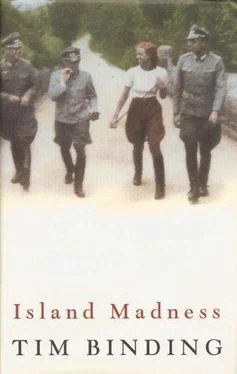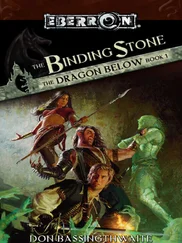Tim Binding - Island Madness
Здесь есть возможность читать онлайн «Tim Binding - Island Madness» весь текст электронной книги совершенно бесплатно (целиком полную версию без сокращений). В некоторых случаях можно слушать аудио, скачать через торрент в формате fb2 и присутствует краткое содержание. Город: Toronto, Год выпуска: 1999, ISBN: 1999, Издательство: Doubleday Canada, Жанр: Историческая проза, Триллер, на английском языке. Описание произведения, (предисловие) а так же отзывы посетителей доступны на портале библиотеки ЛибКат.
- Название:Island Madness
- Автор:
- Издательство:Doubleday Canada
- Жанр:
- Год:1999
- Город:Toronto
- ISBN:9780385258388
- Рейтинг книги:3 / 5. Голосов: 1
-
Избранное:Добавить в избранное
- Отзывы:
-
Ваша оценка:
- 60
- 1
- 2
- 3
- 4
- 5
Island Madness: краткое содержание, описание и аннотация
Предлагаем к чтению аннотацию, описание, краткое содержание или предисловие (зависит от того, что написал сам автор книги «Island Madness»). Если вы не нашли необходимую информацию о книге — напишите в комментариях, мы постараемся отыскать её.
,
and
—albeit with suspiciously jackbooted pirates. But when a young local woman is found murdered, both the islanders and the occupiers are forced to acknowledge that this most civilized of wars conceals a struggle that is darker and more bitter than anyone cares to recognize.
Island Madness — читать онлайн бесплатно полную книгу (весь текст) целиком
Ниже представлен текст книги, разбитый по страницам. Система сохранения места последней прочитанной страницы, позволяет с удобством читать онлайн бесплатно книгу «Island Madness», без необходимости каждый раз заново искать на чём Вы остановились. Поставьте закладку, и сможете в любой момент перейти на страницу, на которой закончили чтение.
Интервал:
Закладка:
Perhaps they are tired of hearing their fellow prisoners’ constant complaints; perhaps his silence, his expressionless face, his slow methodical gait, are welcome changes. They clap him on the back on the few occasions he has seen fit to nod and they grasp his arm when he puckers his mouth or shrugs his shoulders in answer to a question. During the hut hours, when he remains motionless and unblinking, they sit on either side of him, patting food into his limp hand, handing him his tin of watered soup, and at night they lift his feet up onto the bed and draw the blanket close. It is not that he has difficulty in moving. Once set in motion, loping along four abreast, shovelling shingle, breaking lumps of granite in the flint-flashed dark, there is a rhythm to his life that he can run to, holding his own alongside the best of them, but when he stops he sees no reason for starting again. The motor within him has seized up. Take this morning for instance. The triangle had been rung at half-past five, and the boy had swung his legs down and shaken him awake before trotting off to the line of pails. Normally the old man would get him moving, leading him outside to the assembly point, but this time he had forgotten. Van Dielen knew the rules, he had seen it happen often enough, that the last one to stumble out into the frostbitten air got his backside warmed; knew too that the later the arrival the greater the heat, and he did not wish to be beaten, no, he wanted to dig, to lose his life again in the sweet darkness of the island’s heart, but he did not stir, could not; there was something about his plank of wood and the old coat that the boy had wrapped around his shoulders that night which prevented him from moving. He lay there, looking at his bandaged feet, hearing others coughing their guts out onto the sawdust floor, scraping handfuls of lice from their armpits, belching and farting and squirting excrement into the nearby bucket, before scrambling out to stand in shivering lines while the overseer marked them off: he heard it all and yet did not move. The coat was so warm, so familiar, the scent of it so heady, so dreamlike, not the immediate smell of sweat and tar and dank green water, but something else, deep within the lining and soaked into the collar. He pulled it up over his mouth and nose and inhaled. It was as if he was lying on an operating table, breathing in ether through a mask, lurid visions of lost worlds looming up as he feil into a gathering mist. There were faces floating past, eyes creased with the sun shielded by a straw hat, a head of hair in pigtails bouncing on a donkey, a woman in a white dress standing on a raised veranda, the dying sun setting her skin aflame; scènes too, bridges and towers and ribbons of road. He wanted to follow them but his feet were too far away, wrapped in lead, feet that had once walked deserts and crossed ravines, measured out metres and yards, lain in between those of a good woman, run races with a barefooted sprite. He thought he had forgotten most things but briefly he understood that he had not forgotten, simply viewed it all in a different perspective, one in which he played no part. No wife, no daughter, no name, no past. They knew him not when he was alive and he knows them not now that they are dead. His life is but a shadow, a dark irrelevance and one in which he will take no further part. But oh, those pigtails! That barefoot sprite! Then the coat was thrown aside and the blanket torn off and he was pulled to his feet and dragged out by the wrist, his left arm trailing on the floor like he was a monkey in his keeper’s grip, and stood underneath the beams where the two hooks were fixed. Behind him he heard others laugh and shout words of encouragement: ‘If this doesn’t get him talking, nothing will’, ‘Bet he faints after ten’, “Don’t worry, mate, it happens to all of us’—and out of the crowd the boy had stepped forward and pointing to him, had stuck his finger in his ear, making out that the explosions in the tunnel the previous day had made rendered the Dutchman temporarily deaf, and though it had not saved him completely, for by this time his arms had been raised and tied and the whip placed in the man’s hand, the overseer, after shoving the boy rudely aside, had struck him only five times, the flail of leather strands, oiled and supple and fixed to a wooden handle, breaking on his back like the splutter of Christmas crackers. After a final kick in the shins and a long intimidating bellow in his ear, he was cut down, where he stood shaking while the men dispersed, before the boy, the coat back on his shoulders, returned to lead him to the waiting lorry and the day’s work.
And now it is near the day’s close. Soon the evening shift will come and replace them. He is pushing what will be his last but one full wagon, marvelling at his own hands and his own wealed back and the long strength of him. He knows he should be growing weaker, as are the men around him, but he is not. It may have something to do with the boy, who returns to the billet every night before dawn with hunks of bread and strangely composed pies, the cement dust which Unes his pockets its gritty salt, but it is food nevertheless, wonderful food, cold and concentrated, and they chew on it, him and the old man, chew on it and gulp it down, great lumps lodging in their throats, falling asleep to the sound of it churning their stomachs, their juices working like drains. Their farts are becoming different from those of the other men, smelling of meat and vegetables and the laws of decent digestion, rather than those occasioned by sawdust and dysentery. They wake and lift their blankets and waft the meaty fumes towards their nostrils. It is a pleasure shared.
As he nears the tunnel entrance van Dielen hears commotion. Up by the black rubber doors and the great block of light that waits outside stands a group of officers. There is the large fat man who once gave him chocolate, the man who beat him, and another, a handsome man who looks in awe at the great length he has stepped into and the noise he hears bellowing from deep behind its dark and fetid mouth. The man with the chocolate is waving his stick about, pointing towards the very spot on which he stands. Indeed for a second, the two of them, van Dielen in the remnants of his Tootall shirt and Harris tweed trousers, Major Ernst in his black uniform, peer at each other before a couple of fellow workers ease van Dielen aside and start to push his wagon out to the waiting lorries. The wheels grind on the hard concrete floor. Ernst starts shouting in the overseer’s ear. The handsome one walks up and down impatiently. Then the doors swing open and the wagon disappears into the crack of blinding light, and in the flare of darkness that descends, when the doors close once again and the noise ceases and he can see nothing, the conversation comes singing down the tunnel, like voices floating on a summer’s afternoon across a clear and flattened sea. “Looking for a young one,” the fat man says. “Got himself caught up in a murder, the slant-eyed little cunt. Red trousers and a brown coat. You got anyone like that? A woman’s coat, you understand, with…” and he cups his hands in front of his chest, weighing imaginary flesh. They laugh one and all. The overseer nods. He is eager to help. He consults his clipboard. “ Ja, ja ”
Turning quickly, van Dielen bends into the waiting wagon and starts to push the empty cart back up the slight incline. He keeps his head down. He shuts his eyes. He pushes. He must do this, push this empty load, otherwise he might be stopped, ordered to do something else before he can warn the boy, so he pushes, hands on the wooden frame, feet planted firmly on the floor, feeling the wheels resist the slight clitnb, head down, closing his eyes, pushing the wagon of his dreams. The passageway slopes all the way up to the work face, he knows this and yet only now, as he pushes harder, head down, eyes squeezed close, does he ask himself why. Why should a hospital have an entrance where the corridor slopes upwards? It makes no sense, having to push casualties uphill to an operating theatre or a recovery room. It should be level. He opens his eyes and looks beyond. Yes, it does slope up all the way, not by much, fifty centimetres every ten metres perhaps, but it is enough to ensure that the iron-clad wagon can only move back up to the face after considerable exertion. He bends to his task again, and as the wheels start to piek up speed and the voices gather in crescendo he sees something else which he has never noticed before. There are gutters running alongside the foot of every wall, and not just down this passageway but in the rooms he is passing too, where the wards and the kitchens and the cinema will be built, gutters running round the perimeter of every room, as if at some point they will be hosed down, water running off the walls and over the floor. But wards and operating theatres are not hosed down. There is only one type of building he knows of that needs hosing down. An abattoir. An abattoir? An underground abattoir? Come to think of it, who would want to send convalescing men underground, where it is damp, where there is no light, where the air is stale and unhealthy, but now is not the time to question the improbability of such an elaborate and contradictory construction, hearing the stamp of determined feet behind him, one, two, three sets, the fat man with the chocolate, the overseer who had beaten him and the handsome one, all seeking out the boy, the boy who had fed him biscuits and cake and two portions of smoked sausage pie, and placed an old jacket over his cold shoulders, and as he comes up to the intersection, where he can hear him throwing rocks into the next wagon, he abandons his wagon, giving it one lucky slap, as if thanking it for protecting him this far and starts to trot, no rooms now, no gutters either, just the long corridor and the low light and his rag-wrapped feet silent on the puddled floor, and suddenly there he is, the boy, small and perfect, standing beside the battered truck, his grey-white hair glowing in the guttering dark, throwing chunks of rock, pausing to look up as he sees this figure running towards him, weighing a lump of stone in his hand as an improvised defence, then, seeing who it is, the man with no voice, throws it into the wagon, waiting as van Dielen stumbles up, out of breath now. The Dutchman grabs the coat, breathing once again that strangely perfumed material. This is his son he has in his grasp, he knows it. He wants to hold him, to tell him of their history, of the father he could have been, but there is something growing in his windpipe, an adenoidal growth, a cancerous lump, the remnants of an indigestible sausage pie which prevents him from uttering a word. He must be rid of it! He places his hands upon his throat and works them up and down over the scrawn of his Adam’s apple, the footsteps louder now, up and down, up and down, feeling the pressure coming and himself rising out of the ground, bursting like a geyser, tightening and loosening up at the same time, head thrown back, eyes closed, teeth bared, coming up for air, rising out of the white whip of the waves and the black bosom of the earth.
Читать дальшеИнтервал:
Закладка:
Похожие книги на «Island Madness»
Представляем Вашему вниманию похожие книги на «Island Madness» списком для выбора. Мы отобрали схожую по названию и смыслу литературу в надежде предоставить читателям больше вариантов отыскать новые, интересные, ещё непрочитанные произведения.
Обсуждение, отзывы о книге «Island Madness» и просто собственные мнения читателей. Оставьте ваши комментарии, напишите, что Вы думаете о произведении, его смысле или главных героях. Укажите что конкретно понравилось, а что нет, и почему Вы так считаете.












